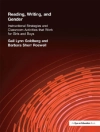Based on the oral histories of eighty migrant women and thirty additional interviews with ‘native’ women in the ‘receiving’ countries, this volume documents the contemporary phenomenon of the feminisation of migration through an exploration of the lives of women, who have moved from Bulgaria and Hungary to Italy and the Netherlands. It assumes migrants to be active subjects, creating possibilities and taking decisions in their own lives, as well as being subject to legal and political regulation, and the book analyses the new forms of subjectivity that come about through mobility.
Part I is a largely conceptual exploration of subjectivity, mobility and gender in Europe. The chapters in Part II focus on love, work, home, communication, and food, themes which emerged from the migrant women’s accounts. In Part III, based on the interviews with ‘native’ women – employers, friends, or in associations relevant to migrant women – the chapters analyse their representations of migrants, and the book goes on to explore forms of intersubjectivity between European women of different cultural origins. A major contribution of this book is to consider how the movement of people across Europe is changing the cultural and social landscape with implications for how we think about what Europe means.
Cover image: Painting by Carla Accardi. Reproduced with the kind permission of Luca Barsi of the Galleria Accademia, Via Accademia Albertina 3/e, 10123 Torino.
Зміст
Acknowledgements
Editors’ Introduction
List of Tables – Table 1
Interviews by Country
PART I: SUBJECTIVITY, MOBILITY AND GENDER IN EUROPE
Chapter 1. On Becoming Europeans
Rosi Braidotti
Chapter 2. “I want to see the world”: Mobility and Subjectivity in the European Context
Ioanna Laliotou
Chapter 3. Transformations of Legal Subjectivity in Europe: From the Subjection of Women to Privileged Subjects
Hanne Petersen
Intermezzo: ‘A dance through Life’: Narratives of Migrant Women
Nadejda Alexandrova and Anna Hortobagyi
PART II: SUBJECTIVITY IN MOTION: ANALYSING THE LIVES OF MIGRANT WOMEN
Chapter 4. Imaginary Geographies: Border-places and ‘Home’ in the Narratives of Migrant Women
Nadejda Alexandrova and Dawn Lyon
Chapter 5. ‘My hobby is people’: Migration and Communication in the Light of Late Totalitarianism
Miglena Nikolchina
Chapter 6. Migrant Women in Work
Enrica Capussotti, Ioanna Laliotou and Dawn Lyon
Chapter 7. The topos of Love in the Life-stories of Migrant Women
Nadejda Alexandrova
Chapter 8. Food-talk: Markers of Identity and Imaginary Belongings Andrea Petö Relationships in the making: Accounts of native women
Enrica Capussotti and Esther Vonk
PART III: PROCESSES OF IDENTIFICATION: INCLUSION AND EXCLUSION OF MIGRANT WOMEN
Chapter 9. Migration, Integration and Emancipation: Women’s Positioning in the Debate in the Netherlands
Esther Vonk
Chapter 10. Modernity versus Backwardness: Italian Women’s Perceptions of Self and Other
Enrica Capussotti
Chapter 11. Moral and Cultural Boundaries in Representations of Migrants: Italy and the Netherlands in Comparative Perspective Dawn Lyon
Chapter 12. Changing Matrimonial Law in the Image of Immigration Law
Inger Marie Conradsen and Annette Kronborg
Intermezzo. In transit: Space, People, Identities
Andrea Petö
Conclusions: Gender, Subjectivity, Europe: A Constellation for the Future
Luisa Passerini
Appendix I: Summary of individual interviewees
Appendix II: Summary of interviewees’ characteristics by nationality
Notes on Contributors
Index
Про автора
Ioanna Laliotou is Assistant Professor in Contemporary History, University of Thessaly, Greece, and is author of Transatlantic Subjects: Acts of Migration and Culture of Transnationalism between Europe and America (Chicago: Chicago University Press, 2004).












